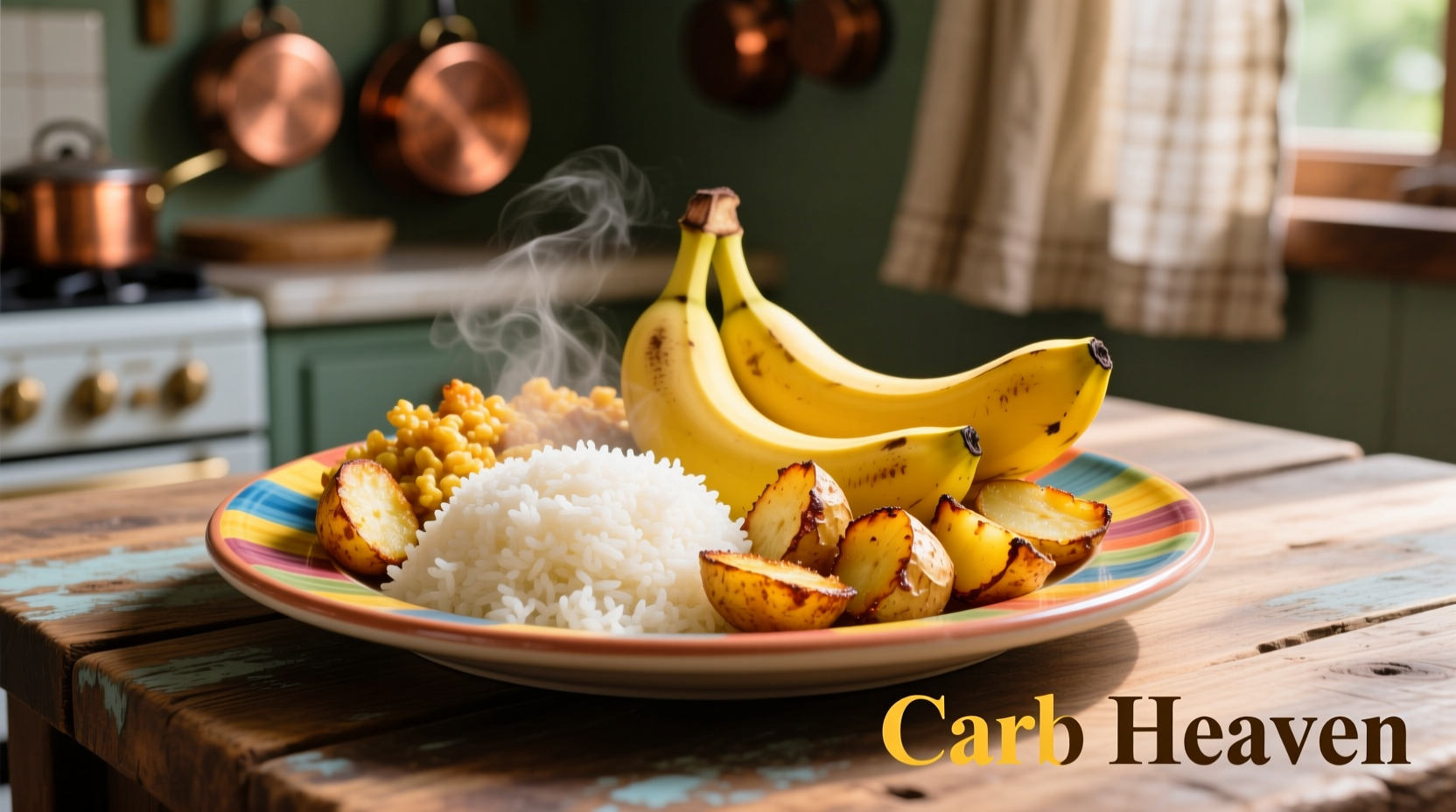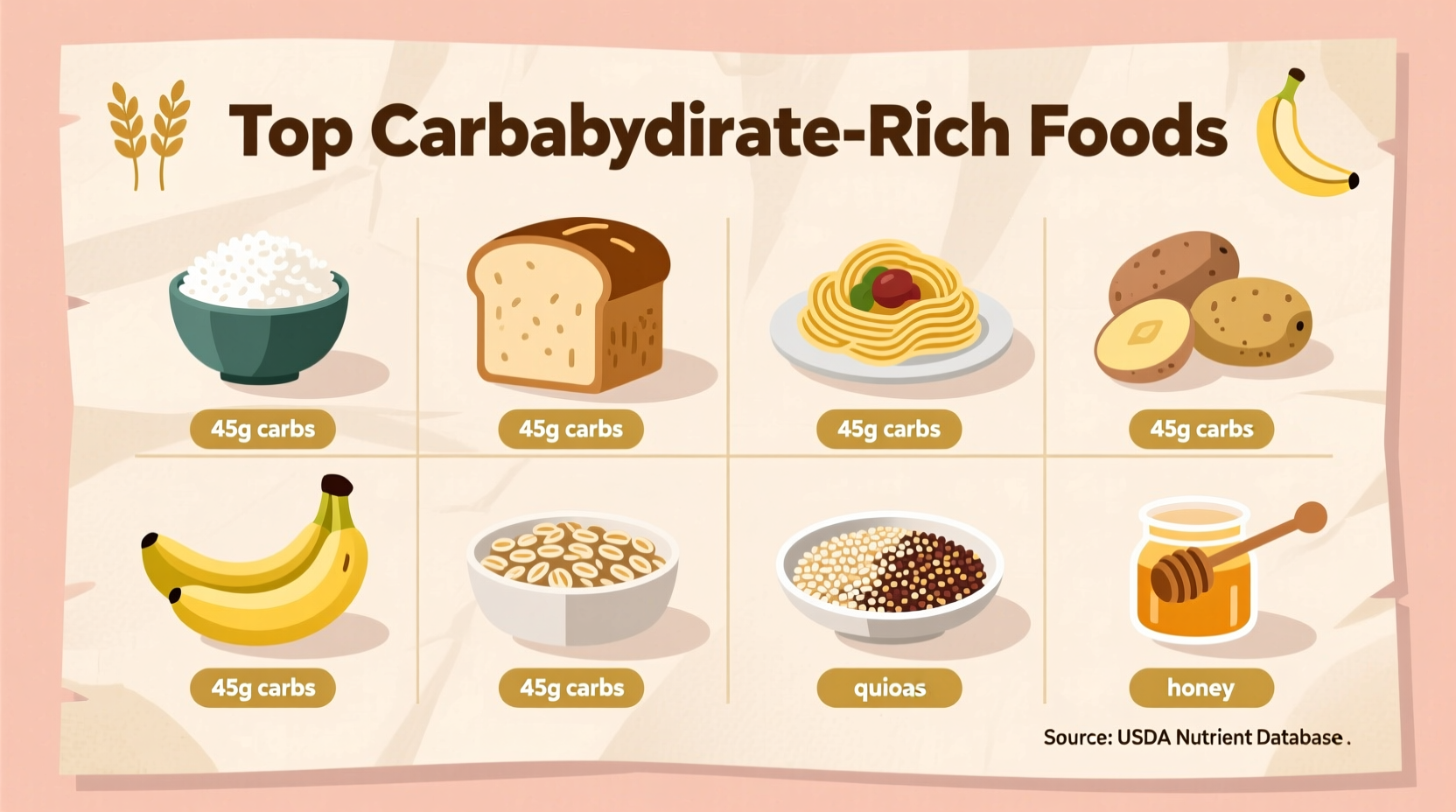Understanding which foods are high in carbohydrates helps you make informed dietary choices whether you're managing blood sugar, fueling athletic performance, or following a specific eating plan. Carbohydrates serve as your body's primary energy source, but not all high-carb foods deliver equal nutritional value. This comprehensive guide identifies the highest carbohydrate foods with precise nutritional data from authoritative sources, helping you distinguish between nutrient-dense options and those offering mostly empty calories.
Grains and Grain-Based Products
Grains form the foundation of carbohydrate intake for most populations worldwide. Whole grains provide additional fiber and nutrients compared to refined versions, though both remain significant carb sources.
When evaluating grain products, pay attention to serving sizes as they dramatically impact total carbohydrate content. That seemingly innocent bagel you enjoy for breakfast likely contains 50-60 grams of carbohydrates - equivalent to eating five slices of bread.
| Food Item | Serving Size | Total Carbs (grams) | Dietary Fiber (grams) |
|---|---|---|---|
| White rice (cooked) | 1 cup | 45 | 0.6 |
| Brown rice (cooked) | 1 cup | 45 | 3.5 |
| Whole wheat bread | 1 slice | 12 | 2 |
| White bread | 1 slice | 14 | 0.7 |
| Oats (dry) | ½ cup | 27 | 4 |
This comparison reveals how processing affects nutritional profiles. While both white and brown rice contain similar total carbohydrate amounts, brown rice provides significantly more fiber, which slows digestion and prevents blood sugar spikes. The USDA FoodData Central database confirms these values, demonstrating that whole grain choices deliver additional nutritional benefits without reducing overall energy content.
Starchy Vegetables
Many vegetables contain substantial carbohydrates, particularly those classified as starchy. Unlike grains, these provide vitamins, minerals, and fiber alongside their carb content.

Potatoes represent one of the most concentrated vegetable sources of carbohydrates. A medium baked potato with skin contains about 37 grams of carbs, while sweet potatoes offer slightly less at 24 grams per medium potato but with significantly more vitamin A. Corn stands out among vegetables with approximately 27 grams of carbs per cup.
Fruits: Nature's Sweet Carbohydrate Sources
Fruits provide carbohydrates primarily as natural sugars (fructose and glucose), along with essential vitamins, minerals, and phytonutrients. While all fruits contain carbs, some varieties pack significantly more than others.
Mangoes, bananas, grapes, and cherries rank among the highest carbohydrate fruits. A single medium banana contains about 27 grams of carbs, while one cup of grapes delivers approximately 26 grams. Dried fruits concentrate carbohydrates through water removal - just ¼ cup of raisins contains 34 grams of carbs.
Legumes: Protein and Carb Powerhouses
Beans, lentils, and peas offer a unique combination of protein and carbohydrates. A cup of cooked lentils contains about 40 grams of carbs along with 18 grams of protein and 15 grams of fiber. While technically high in carbohydrates, legumes have a lower glycemic impact due to their substantial fiber and protein content.
Understanding Context and Limitations
Whether a high-carb food benefits your diet depends entirely on your individual health context and goals. Athletes training intensely may require substantial carbohydrate intake for optimal performance, while individuals managing type 2 diabetes need to carefully monitor carb consumption.
The American Diabetes Association recommends personalized carb counting rather than blanket restrictions, noting that "the right amount of carbs varies by individual based on activity level, medication, and metabolic response." Similarly, the Dietary Guidelines for Americans suggest that carbohydrates should comprise 45-65% of total daily calories for most adults, translating to 225-325 grams for a 2,000-calorie diet.
Reading Nutrition Labels Effectively
When evaluating packaged foods, focus on total carbohydrate content rather than just sugar content. Many products market themselves as "low sugar" while remaining high in other carbohydrates like starches. Check the serving size carefully, as manufacturers sometimes use unrealistically small portions to make products appear lower in carbs.
For those following low-carb diets, understanding "net carbs" (total carbs minus fiber and sugar alcohols) can be helpful, though this approach has limitations. The Academy of Nutrition and Dietetics cautions that "not all fiber and sugar alcohols affect blood glucose equally, so net carb calculations provide only an estimate."
Frequently Asked Questions
Which fruits have the highest carbohydrate content?
Bananas, mangoes, grapes, and cherries contain the highest carbohydrate levels among common fruits. A medium banana provides approximately 27 grams of carbs, while one cup of grapes contains about 26 grams. Dried fruits like raisins are particularly concentrated, with ¼ cup delivering 34 grams of carbohydrates due to water removal during processing.
Are all high-carb foods unhealthy?
No, many high-carb foods are extremely nutritious. Whole grains, legumes, starchy vegetables, and fruits provide essential vitamins, minerals, and fiber alongside their carbohydrate content. The key distinction lies between nutrient-dense high-carb foods and those offering primarily empty calories like sugary beverages and highly processed snacks.
How many carbs should I eat daily?
The Dietary Guidelines for Americans recommend that carbohydrates comprise 45-65% of your total daily calories. For a standard 2,000-calorie diet, this translates to 225-325 grams of carbohydrates daily. Individual needs vary based on factors including activity level, health conditions, and personal goals. Those managing diabetes or following specific therapeutic diets may require different carb allocations.
What's the difference between simple and complex carbohydrates?
Simple carbohydrates (sugars) contain one or two sugar molecules and are quickly digested, causing rapid blood sugar spikes. They're found in fruits, milk, and added sugars. Complex carbohydrates (starches and fiber) contain longer sugar chains that take more time to break down, providing sustained energy. Whole grains, legumes, and starchy vegetables are primary sources of complex carbs. Fiber, while technically a carb, doesn't significantly impact blood sugar.











 浙公网安备
33010002000092号
浙公网安备
33010002000092号 浙B2-20120091-4
浙B2-20120091-4